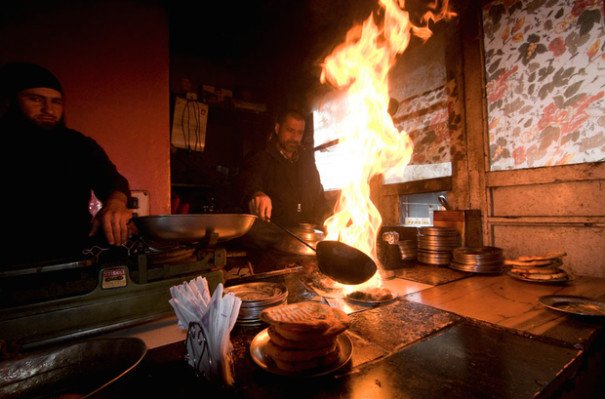
It Is Possible to Have too Much of a Good Thing

It Is Possible to Have too Much of a Good Thing
Harissa in Kashmir
The mouthwatering smell slowly sifts through the early morning chill. It is 7 am and there are dozens of men and women braving the bitter Kashmir winter to gather around a steaming brass pot in the doorway of a small shop in the old quarter of Srinagar. The mixed aroma of spices, cooked rice, and mutton wafts from the pot. A bearded man, heavily built, carefully inspects the simmering contents with the help of a large wooden spoon and then nods at the crowd gathered around him. “Your harissa is ready,” he says.
Twenty minutes later, I am seated at a small table inside the shop. On the garishly painted table before me, a plate of harissa, garnished with a generous sprinkling of hot edible oil, awaits me as I talk with Nazim, the third-generation owner of the shop that sells the best winter breakfast in Kashmir. His eatery is one of the five outlets in old Srinagar that still serves the traditional delicacy.
“If you have taken a substantial portion of harissa in the morning, that is your major meal for the day. And it actually wards off the cold,” Nazim says. It take eight hours to make the harissa, which is prepared overnight in huge earthenware vessels over a slow fire. Even before that, the preparation entails a meticulous mincing of deboned mutton, which is mixed with local rice, fennel seeds, cinnamon, cardamom, and salt.
I get back to the steaming plate on my table and take a tentative jab at the semi-solid concoction with a portion of a naan bread. The blend of succulent lamb shanks with fine grains of rice is out of this world and the distinct taste of the spices tickles my taste buds. Nazim refills my plate with a generous second helping. “I won’t encourage you to take a third, though,” he says with a smile.
Indeed. A popular story tells of an Afghan governor of Kashmir in the 18th century who was so fond of harissa that he didn’t know when to stop. He died of overeating.